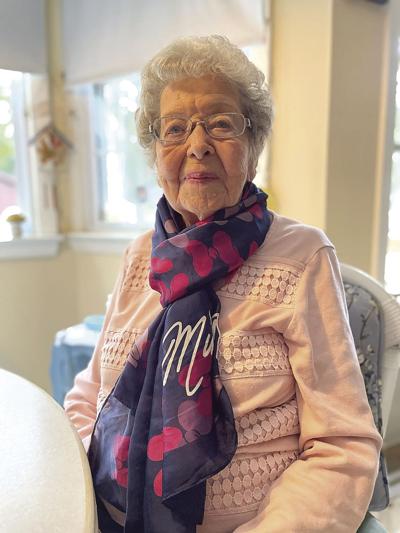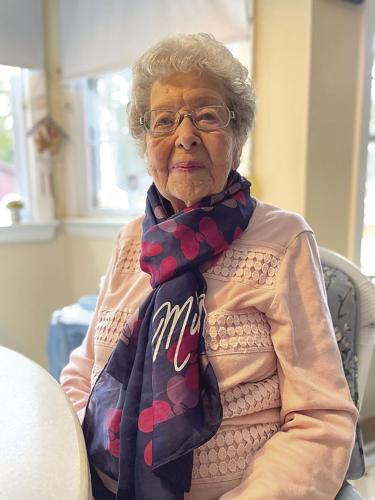In September 1942, Pansy and her fiancé, Garland Louder, were in a hurry to be married. She was barely 20, and he barely 22, but the U.S. was at war, and Pansy’s man wanted to make sure he would have someone to come home to at the end of the war.
They didn’t have time to plan a church wedding — she didn’t even have a wedding dress — so the two of them traveled to Cheraw, S.C., to get hitched.
At a Piggly Wiggly grocery store.
“Well, this friend of ours took us down to Cheraw and to this Piggly Wiggly store,” said Pansy Dodson. “The proprietor took his apron off and walked us up to a little room. He was also a Justice of the Peace. And he married us. I think my husband must have given him $5.”
It turned out, Pansy and her husband’s express-lane nuptials were unnecessary, as Garland had a heart condition that prevented him from being able to serve. The two were married 22 years before Garland passed away from emphysema.
On July 18, Pansy will reach the century mark. She has lived in the rural Orange County community for 58 years, and continues to work in her garden and write uplifting poetry that she sends to friends and other acquaintances she knows who are unable to get out and about. As is expected, people want to know what the secret is to such a long life, but Pansy shrugs her shoulders.
“I don’t know why I lived so long,” she said. “Except god. I have faith in god. I’ve tried to be a Christian most of my life. And I just take it a day at a time. I never exercise, or jog, or do all of these things to knock myself out. Being old is not that much fun. You have a lot of different feelings.”
No one is more surprised at her longevity than Pansy. She’s done genealogy studies on both sides of her family, and had to go back to the year 1750 to find a relative who lived 100 years.
Pansy was born in Durham, and was the first child in her neighborhood to graduate from high school. She had three sisters and one brother.
“Most of them quit after the ninth grade because that was as far as the school in the neighborhood went,” she said. “They’d go to work at 16-years-old. My sister did, my older brother did. But my one goal growing up was to finish high school. And I did. It wasn’t easy. We had no buses. We had to furnish our own ways of getting to and from the high school. We lived three miles away, and I walked home most every afternoon.”
After high school, Pansy put in a job application at Liggett Myers Tobacco Co. She went to work at the cigarette-maker in February 1942, and one of the first tasks Liggett Myers had women do was take the government stamps off Piedmont Cigarettes that were returned.
Soon after, the women at the company were moved to jobs that normally were held by men, but the armed services were pulling them away. It was at Liggett Myers that Pansy met her first husband, whom she married in a rush. She continued with the company even after Garland’s death, and was promoted to supervisor. She would eventually meet Vincent Dodson, who would become her second husband.
Pansy and Vincent were co-workers who enjoyed each others’ company. He had a reputation for being someone who attended to his appearance, but also liked to tell jokes. Pansy made clear to him that she wasn’t interested in jokes that were anything less than wholesome, and Vincent was always respectful. Their marriage grew from a solid friendship.
Pansy said Vincent wanted a family, but she was unable to have children because of a medical procedure she had when she was young. She had one daughter, who she adopted, who had grandchildren.
Vincent would become ill and pass away from prostate cancer. In 2006, she hired Tanya, a caregiver, to help wither her daily needs. “She’s just like a daughter to me,” Pansy said. “She’s taken good care of me.”
For years, Pansy has written blessings and poetry as her way to, she hopes, raise the spirits of her friends, family, and other members of the community. She said it’s her way of processing events — good and bad — that are happening around the world and closer to home. Eventually, she compiled some of them and published a book.
Not long after, at the urging of her granddaughter, Allison, Pansy published another book of her writings about her life as a way of preserving stories that could be shared with her family, even after she is gone. In the book, Pansy provides anecdotes that compare her granddaughter’s experiences with her own when she was her granddaughter’s age.
“You know a lot of people are curious about how life was,” Pansy said. “You read a lot of historical articles, but they don’t touch the common person that’s living down here about what they’re really dealing with, and that’s what I think the little Book of Allison is about. It’s about change between my life and her life, and how things are different.”
Heading into her 100th birthday, Pansy continues to use poetry as her way of expressing her observations. She has always been an avid gardener and continues to do so. She has someone who will regularly come by her home to help her in the garden, digging rows, while Pansy follows in her scooter, dropping seeds to be covered with soil.
Pansy said she understands the accomplishment of reaching the century mark in age, but she’s not excited for it. Still, she plans to put the celebration to good use.
“It’s got to have a purpose more than just me being 100,” she said. “That’s not a purpose. Absolutely no personal gifts. I don’t need another thing in this house. But if each person would bring food items to go to a food pantry in Orange County, that would be a purpose. That would be acceptable.”









Commented
Sorry, there are no recent results for popular commented articles.